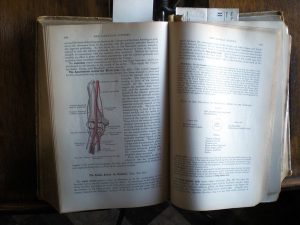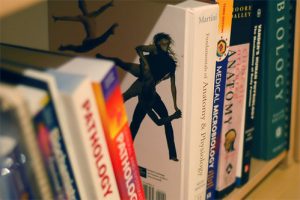13 Reading in College
Good writing begins with good reading. Every time you read, you’re exposed to someone else’s ideas and to their way of writing: their word choice, vocabulary, knowledge base, use of language, and so forth. How do you become a reader or a better reader?
First, read every day. And vary the materials you read: a book, a magazine article, an online blog, etc. Try readings things that are a little challenging. In other words, don’t just vary the subject matter–vary the difficulty, too. Stretch!
Second, learn and practice the skills of effective reading (which are explained below in this section).
Third, keep reading. Every day. And use good effective reading skills.
Fourth, learn and practice the skill of reading critically.
Fifth, keep reading. Yes, every day, putting your skills to work. (Practice makes perfect!)
Sixth, well, you know.
Reading effectively means reading in a way that helps you understand, evaluate, and reflect on a written text. As you might guess, these skills are very important to college students, no matter what field you’re going into: you’ll be doing a lot of reading. The more effectively you read, the easier it’ll be, the less time it will take, and the more you’ll enjoy the experience.

People who read effectively use a variety of skills and techniques:
- They start by creating an optimal setting for reading. They pick the best time, place, and conditions.
- They engage in pre-reading strategies before starting to read
- They read material efficiently: they pick up a piece of material, engage actively with it, and finish.
- They create a reading environment that helps decrease distractions.
- They annotate written texts (in other words, they write directly on the texts) or take notes as they read. By doing this, they enter into a discussion with the text, interacting with it.
- They research or investigate content they don’t fully understand.
- They work to discover the central meaning of the piece. They ask themselves
- What is the author’s point?
- What is the text trying to say?
- What story is the author telling?
- How does the author create and build this meaning?
- They reflect on what the text means to them, internalizing the meaning:
- How am I responding to this text?
- Why am I responding that way?
- What does the text make me think about?
- What does this information mean to me?
READING IN COLLEGE
College-level reading is different from the kind of reading done in high school. The types of texts and assignments differ, but also the expectations for critical thinking, analysis, and synthesis of ideas. The more you are able to read effectively at the college level, the greater your chances of having success in college, economic advancement, and a more fulfilling life.

ACTIVE VS. PASSIVE READING
Have you ever read a page from a textbook and at the end of the page realized you have no idea what you just read?
Successful readers develop active reading habits that improve their reading comprehension, speed, and enjoyment. Active reading involves deeper engagement with the text before, during, and after reading.
A good way to understand active reading is by comparing it to what it is not, what’s sometimes called passive reading.
Annotate and Take Notes
As children, most of us were told never to write in books, but now that you’re a college student your teachers will tell you just the opposite. Writing in your texts as you read—annotating them—is encouraged! It’s a powerful strategy for engaging with a text and entering a discussion with it. You can jot down questions and ideas as they come to you. You might underline important sections, circle words you don’t understand and use your own set of symbols to highlight portions that you feel are important. Capturing these ideas as they occur to you is important, for they may play a role in not just understanding the text better but also in your college assignments. If you don’t make notes as you go, today’s great observation will likely become tomorrow’s forgotten detail.
Important note: most college and university bookstores approve of textual annotation and don’t think it decreases a textbook’s value. In other words, you can annotate a college textbook and still sell it back to the bookstore later on if you choose to. Note that I say most—if you have questions about your own school and plan to sell back any textbooks, be sure to ask at the bookstore before you annotate.
If you can’t write on the text itself, you can accomplish almost the same thing by taking notes—either by hand (on paper) or e-notes. You might also choose to use sticky notes to capture your ideas—these can be stuck to specific pages for later recall.
Many students use brightly-colored highlighting pens to mark up texts. These are better than nothing, but in truth, they’re not much help. Using them creates big swaths of eye-popping color in your text, but when you later go back to them, you may not remember why they were highlighted. Writing in the text with a simple pen or pencil is always preferable.
![]() When annotating, choose a pencil or ball-point ink rather than a gel or permanent marker. Ballpoint ink is less likely to soak through the page. If using erasable pens, test in an inconspicuous area to make sure they actually erase on that paper.
When annotating, choose a pencil or ball-point ink rather than a gel or permanent marker. Ballpoint ink is less likely to soak through the page. If using erasable pens, test in an inconspicuous area to make sure they actually erase on that paper.
What about e-books? Most of them have onboard tools for note-taking as well as providing dictionaries and even encyclopedia access. If you aren’t sure, check with your professor. They may know a few of the note-taking tools that you can use.
Many students also like to keep reading journals. A good way to use these is to write a quick summary of your reading immediately after you’ve finished. Capture the reading’s main points and discuss any questions you had or any ideas that were raised. Include the author and title, and write out an MLA citation for the source.
REFLECT
Whenever you finish a bit of college reading, it’s worth your time to stop and reflect on it. This not only helps you think about the content and what it means to you, but it also helps cement it within your memory, allowing you to recall the key ideas later and to apply them in other reading and writing situations.
COMMON READING SYSTEMS
You probably have a process or system for many common things you do—like getting ready in the morning, going to work or school, or doing chores.
Do you have a process for reading?
Putting the ideas of annotation and reading together to prepare for studying can really help you to succeed as a student.
There are several reading systems used by college students to improve their reading comprehension. The most common ones are SQ3R, KWL, and Cornell Notes.
- SQ3R: SQ3R is a reading comprehension method developed in the 1940s to help college students read textbooks. The name stands for survey, question, read, recite, and review, which are the steps in the process advocated by this reading system. The steps cover what to do before, during, and after reading. Follow the links below for more information about this system.
- KWL: KWL was designed to help students conduct research. The acronym stands for know, want, and learn. The system involves creating a graphic organizer—in this case, a chart. The chart has three columns: what I know, what I want to know, and what I learned. Students answer the first two columns before doing research and the third column after the research is over. Follow the links below for more information about this system.
- Cornell Notes: Cornell Notes is a comprehensive note-taking system developed in the 1950s by a professor at Cornell University to help college students improve their study skills. The system involves creating a table with two columns. In the right column, which is the larger column, the student writes notes from a lecture or text. In the left column, the student goes back and writes keywords, main ideas, or questions about the notes. Afterward, the student reviews the notes and writes a short summary of the main ideas beneath the two columns. Follow the links below for more information about this system.
ATTRIBUTION
- Content Adapted from Excelsior Online Writing Lab (OWL) (2020) is licensed under a Creative Commons Attribution-4.0 International License.
- The Word on College Reading and Writing by Carol Burnell, Jaime Wood, Monique Babin, Susan Pesznecker, and Nicole Rosevear is licensed under a Creative Commons Attribution-NonCommercial 4.0 International License.

